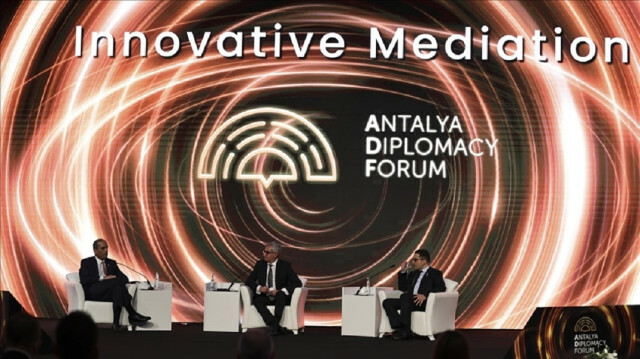
Foreign ministers speak during panel discussion at Antalya Diplomacy Forum in southern Turkey
Qatari and Kuwaiti top diplomats discussed the innovative mediation in a panel at the Antalya Diplomacy Forum in southern Turkey on Friday.
Qatari Foreign Minister Mohammed bin Abdulrahman Al Thani and his Kuwaiti counterpart, Ahmed Nasser Al-Mohammed Al-Ahmed Al-Jaber Al-Sabah, met during a panel moderated by Turkish Madrid Ambassador Burak Akcapar at the NEST Convention Center.
In his speech, Al Thani said the nature of conflicts is evolving and becoming more complex and diverse nowadays.
Noting that the conflict in cyberspace has increased, Al Thani emphasized that there is no mediation framework for such conflicts and that the concept of mediation needs to be developed more.
He said that with the development of technology, new mediation areas have emerged.
The basis of mediation is "to touch people," to establish contact between humans and to understand each other, he said, adding that building trust is the most important element in the mediation process.
He went on to say that many countries are qualified to assume the role of mediator, and that "a suitable mediator" must be found based on the conflict and its subject.
Pointing out that the mediator should be fast and agile, Al Thani said it is also important to choose a country that has a command of the regional dynamics as a mediator.
- Afghanistan conflict
Speaking on the conflict in Afghanistan, he said that not much progress has been achieved.
Recalling that the withdrawal of US forces from Afghanistan will be completed in September and the timing is critical, Al Thani said there is "no consensus" on what the future of Afghanistan will look like.
The US army withdrawal is currently set to be finished by Sept. 11.
He said the first goal there is to achieve a cease-fire between the government and the Taliban.
Al Thani underlined that Qatar wants to hold an Istanbul meeting between world leaders, adding that this has not yet happened due to "complexities," and that the meeting could be a "step forward."
- 'Parties should trust, respect mediator'
Al-Sabah said mediation is a concept that changes its shape.
Emphasizing the importance of reliability and transparency in mediation, Al-Sabah touched on the experiences his country gained from the Gulf crisis.
He highlighted that Kuwait knows and observes that new conflicts may arise in the "vacuum" created by the absence of international law and the UN Charter and its requirements.
When asked about his views on the conflict in Yemen, Al-Sabah said that Yemen is going through a very tragic situation.
He said that some elements, unfortunately, were "really stubborn" in Yemen's conflict and they thought of their interests rather than the interests of their nation.
"Therefore, we see that this conflict still continues. Whenever we cease to abide by international law and cease to depend on the references of international law, then anything is possible. Many efforts are currently being made to bring this conflict to an end. We should appreciate that too," he said.
Yemen has been ravaged by violence and instability since 2014, when Iran-aligned Houthi rebels captured much of the country, including the capital, Sanaa.
A Saudi-led coalition aimed at reinstating the Yemeni government worsened the situation, causing one of the world’s worst man-made humanitarian crises, with 30 million people which account for 80% of the population, needing humanitarian assistance and protection.
Asked about the risks of being a mediator, Al-Sabah said it is like "swimming in very dangerous waters" and trying to be neutral, which is not easy.
He also emphasized that in mediation, parties should be willing, trust and respect the mediator, and participate in the mediator's efforts toward a solution.
*Writing by Jeyhun Aliyev from Ankara

